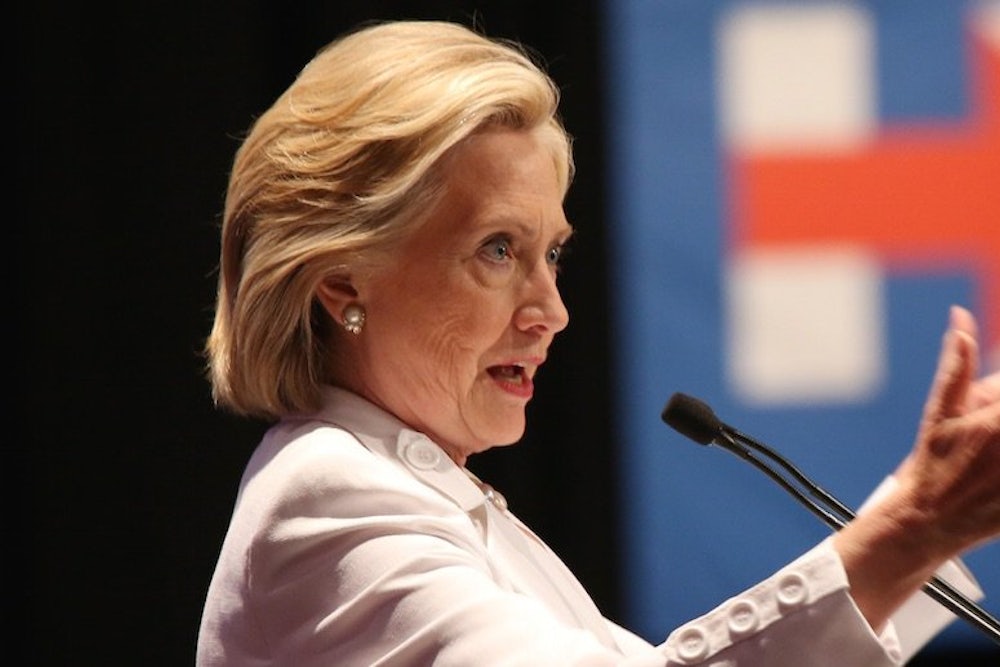Shortly after a gunman killed nine congregants of the historic Emanuel African Methodist Episcopal Church in Charleston, South Carolina, the state’s Republican Governor, Nikki Haley, issued a statement which read in part, “we'll never understand what motivates anyone to enter one of our places of worship and take the life of another.”
About nine hours later, investigators solved that supposedly eternal mystery. The FBI identified the suspect as Dylann Storm Roof, a young man who adorns himself in the apartheid-era flags of Rhodesia and South Africa, and who was recently given a .45 caliber pistol for his 21st birthday. Law enforcement officials called the rampage a hate crime, which at the very least tells us a lot about what motivated him to enter a place of black worship and take the lives of others.
As it happens, Hillary Clinton was traveling through Charleston the day of the shooting, continuing a presidential campaign that’s unmistakably organized around the notion that one party (her party) speaks to the interests of American minorities, and the other does not. Her campaign is just as unmistakably marked by choreography and caution. Today would be the day to break with this scriptedness—even if alluding to the country's ongoing race problems will inflame whites, not just in South Carolina, who take umbrage at the suggestion that such problems explain anything.
Haley’s statement, after all, revealed more than just a cautious unwillingness to speak conclusively in the chaotic moments after a mass tragedy. It reflected a deeper discomfort with the scenario that ran through so many minds once news about the shooting broke: that the killer would turn out to be a white supremacist. “[H]e had that kind of Southern pride, I guess some would say," one classmate said. "Strong conservative beliefs … made a lot of racist jokes, but you don't really take them seriously like that.”
This discomfort is pervasive, and completely understandable. On ABC’s "The View," South Carolina Senator and Republican presidential candidate Lindsey Graham was at pains to disentangle the racial aspect of the crime from its broader context: “What it’s not, in my view, it’s not a window into the soul of South Carolina … it’s about this guy. This guy has tons of problems.” He concluded with a reminder that beyond the lone sickos “there are people out there looking for Christians, to kill them. So this is a mean time we live in.”
Fox News entertained the notion that the killings were motivated by religious rather than racial bigotry. This is an altogether more soothing way for the tribunes of Southern culture to explain the carnage than grappling with the fact that many of our most antiseptic-sounding political identifiers—“Southern pride,” “states’ rights”—overlap with white supremacy.
The temptation to tiptoe past the implications of the Emanuel church killings will exist outside the right, too. It’s so tricky precisely because themes like “Southern pride” and “white supremacy” are not coterminous. But the temptation should be ignored—first and foremost by the emerging leader of the Democratic Party. Hillary Clinton can’t avoid speaking candidly about this particular social undercurrent if she wants to run the campaign she’s signaled her desire to run. And that means coming to terms with the fact that her interventions will polarize the country along racial and partisan axes simultaneously.
This phenomenon has been a hallmark of Barack Obama’s presidency. When he’s spoken passionately about the violent taking of black life—in fact, when he’s spoken about it in completely perfunctory terms—the public’s bearing has tended to shift perceptibly, and always in the same, predictable way. That Obama is black himself has made the backlash to his statements deeply personal and disquieting. Obama once famously said, "If I had a son, he’d look like Trayvon [Martin]." To this day, white conservatives blame Obama for inflaming the racial tension surrounding Martin’s killing, and frequently respond to acts of black-on-black or black-on-white violence with reminders that Obama isn’t comparing the perps to his offspring.
But the polarization itself isn’t solely, or even mostly, a function of Obama’s race. It’s also a function of the broadly cosmopolitan values he represents. If it’s Hillary Clinton’s goal is to inherit Obama’s electorate by embracing those values, it will require occasionally stating obvious, uncomfortable facts about American society—that racial hatred is an elemental fact of our history and that, contra Haley, we know what motivates killers like Roof—even when that feels like a risky political proposition.
Update: In remarks to the National Association of Latino Elected and Appointed Officials in Las Vegas, Thursday afternoon, Clinton addressed the mass killing at Emanuel AME in Charleston, and alluded subtly to its fraught implications: "In order to make sense of it," Clinton said, "we have to be honest. We have to face hard truths about race, violence, guns, and division.... More than 50 years ago Dr. Martin Luther King, Jr. told the families of the girls killed in the bombing of the 16th St. Baptist church in Birmingham, Alabama, 'you do not walk alone.' Today we say to the families of Mother Emanuel and to all the people of Charleston, 'you do not walk alone.'"
